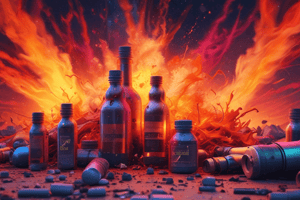Podcast
Questions and Answers
What is an explosive?
What is an explosive?
A substance containing a large amount of stored energy capable of undergoing a rapid chemical reaction.
What is an explosion?
What is an explosion?
A rapid increase in volume and release of energy, usually with high temperatures and the release of gases.
What was the first chemical explosive invented by the Chinese approximately 1,000 years ago?
What was the first chemical explosive invented by the Chinese approximately 1,000 years ago?
- Gunpowder (correct)
- TNT
- Dynamite
- Nitroglycerine
What are the two main classifications of explosives based on their speed of expansion?
What are the two main classifications of explosives based on their speed of expansion?
What characterizes low explosives?
What characterizes low explosives?
What is the role of a primer in firearms?
What is the role of a primer in firearms?
What is considered the first high explosive used in commercial blasting?
What is considered the first high explosive used in commercial blasting?
Who invented dynamite and what did it consist of?
Who invented dynamite and what did it consist of?
Which of the following is NOT a type of dynamite that uses nitroglycerine?
Which of the following is NOT a type of dynamite that uses nitroglycerine?
Flashcards are hidden until you start studying
Study Notes
Explosives
- Explosives contain large amounts of stored energy and undergo rapid chemical reactions
- Explosions involve a rapid increase in volume, energy release and generation of heat
- Gunpowder is the first known chemical explosive, invented in China around 1,000 years ago
- Gunpowder is a mixture of sulfur, carbon (charcoal) and potassium nitrate (saltpeter)
Explosive Classifications
- Explosives are classified based on the source or mechanism of pressure production
Mechanical Explosives
- Depend on physical reactions
- Are used for mining, but not widely used
Chemical Explosives
- Are substances or mixtures
- Experience violent combustion when ignited
Kinds of Explosives
- Explosives are classified according to their expansion speed
Low Explosives
- Burn at a slower rate
- Create less pressure
- Are used as propellants in rockets and firearms
High Explosives
- Detonate rapidly and create high pressure
- Examples include TNT and dynamite
Primer
- Initiates propellant combustion in firearms and artillery
- Is a volatile substance that ignites when struck
Nitroglycerine
- Used as the first commercial blasting explosive
- Is dangerous due to its instability
Dynamite
- Invented by Alfred Nobel in the late 1800s
- Is a safer form of high explosive
- Consists of a mixture of nitroglycerine and kieselghur, packed into sticks
- Does not explode accidentally when hammered, dropped, or burned
- Dynamite contents can include nitroglycerine (NG), ethylene glycol dinitrate (EGDN), ammonia-gelatin and sawdust
Types of Dynamite Using Nitroglycerine
- Straight dynamite
- Ammonia dynamite
- Gelatin dynamite
- Ammonia-gelatin dynamite
Straight Dynamite
- Is dangerous due to its high nitroglycerine content
Studying That Suits You
Use AI to generate personalized quizzes and flashcards to suit your learning preferences.




